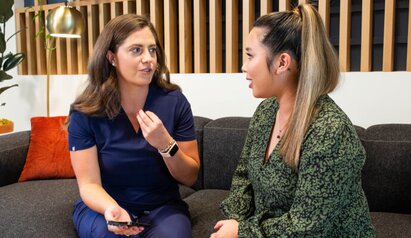Speech Therapy Techniques for Stuttering


Published July 8, 2021

As a speech language pathologist, I’m always looking for new therapy activities that provide quality care and are meaningful for my clients. And a great way to support your clients’ communication goals is to incorporate technology with the use of apps. Here’s a list of the top 10 must-have apps for SLPs that address everything from dysphagia to voice therapy and more.
1. Apraxia Therapy
Clients with motor planning impairments such as apraxia of speech often benefit from visual and verbal cues. The Apraxia Therapy app utilizes video-assisted speech therapy (VAST) to model oral cues to help sequence motor movements for speech. Exercises include rote sequencing tasks (like counting), phrases, and multisyllable words.
Clients can follow the hierarchy, listening, tapping, and saying the target in unison—while visual and verbal cues gradually fade away. Responses can be recorded, and clients have an opportunity to rate their own speech. SLPs can use these ratings to monitor client satisfaction and overall progress. ($24.99)
2. Language Therapy 4-in-1
This app is perfect for clinicians who work with clients with aphasia or individuals who suffered a brain injury. Language Therapy combines four different apps in one and includes more than 700 nouns, verbs, and adjectives to strengthen both expressive and receptive language skills. The four apps include:
You can fully customize each lesson by selecting targets from a list of categories as well as choosing the number of trials and choices presented. This app makes it easy to track progress and collect objective data for documentation. Whether you work in a skilled nursing facility or a busy hospital, this app is a great resource to support your clients and their communication needs. You can individually download each app, or try it for free with Language Therapy Lite. ($74.99)
3. Constant Therapy
This app is perfect for SLPs that work with adults. If you’re seeing patients who have suffered a stroke, traumatic brain injury (TBI), or have been diagnosed with other neurological conditions, Constant Therapy is a great app to use. It incorporates evidence-based exercises that can be integrated into your therapy sessions to support your client and their goals. You can easily select activities targeting speech, language, and cognition.
Whether you’re working to improve basic expressive language or more advanced concepts for problem-solving, you can customize the exercises to suit your client’s needs. There’s even a client app, so you can assign exercises to help facilitate carryover of skills. (Free)
4. Dysphagia Therapy
If you want to feel confident in evaluating and managing a patient’s dysphagia, the Dysphagia Therapy app is a must. It features a Therapy Finder, so you can select the impairments you observe through your clinical swallow exam or instrumentals. It then generates a list of evidence-based exercises and compensatory strategies. Each exercise includes step-by-step instructions and a list of references. It also offers diagrams and visuals that you can incorporate into your therapy session for client and caregiver training. ($14.99)
5. My PlayHome
This is an interactive doll house app. Not only do kids love this app, but SLPs do too. This app can support a child with language delays to help facilitate communication and carryover into the home environment. You can pick a family member, navigate through various rooms, and select objects from around the house.
My PlayHome provides endless opportunities to practice vocabulary, following directions, prepositions, and more. Clinicians can move the characters, or let the children have control to make their own choices. My PlayHome is fun and motivating for children. Plus, clinicians can also use it as a reward or as part of their therapy session. ($3.99)
6. Early Words with Splingo
Splingo is an app designed for younger kids to support early vocabulary development. The app includes 100+ high frequency words and can be customized by difficulty level, word types (like nouns and verbs), and frequency of rewards. This app can be included as part of your session for children with limited expressive language skills or more significant developmental needs. Keep your client’s attention with immediate verbal praise and frequent interactive mini games in between trials. ($2.99)
7. Toca Kitchen
Toca Kitchen is a common favorite amongst SLPs working with younger children. This app is an interactive game where clients choose a character, and make a meal in the kitchen. As you prepare the meal, the character will give you facial cues indicating whether they like or don’t like the food. Clinicians can use the app to target foundational communication skills such as naming objects, making choices, following directions, and social pragmatic skills. ($3.99)
8. Articulation Station
Articulation Station includes 20 sounds and is the most comprehensive articulation app out there. SLPs can integrate this app into therapy sessions by targeting a single sound or multiple sounds in the initial, medial, or final positions of words. You can vary the complexity of your targets from word, phrase, sentence, or short story level. Use the recording feature to provide auditory feedback and opportunities to teach children how to produce sounds.
Matching games and silly word combinations make therapy fun and engaging for your clients. School-based SLPs and private practice SLPs also love this app because it can be easily incorporated in individual or group sessions working with children who have different articulation goals. ($59.99 for Pro—includes all letters)
9. Pryde Voice & Speech Therapy
The Pryde Voice Feminization app was created by an SLP who specializes in gender spectrum voice modification. Voice feminization helps clients fine tune and make adjustments to their voice in order to match their gender identity. This app includes structured tasks targeting breath support, pitch, fluency, and resonance. Prerecorded words and phrases can be played to model target behaviors such as rising intonation or elongating vowels.
Many of the exercises include opportunities for practice and provide a visual pitch graph for clients to self-monitor. Clients can record themselves at their preferred pitch or try to match the model using the strategies as trained by the clinician. Using this app, clients can feel empowered to reach their goals. (Free for a limited version)
10. Overdrive
Overdrive is not specific to SLPs, but it’s still a wonderful addition to your app collection. Overdrive lets you borrow free ebooks as well as audiobooks from your local library. All you need is a library card. Incorporating books into your therapy plans is a great way to target literacy skills, narrative development, and reading comprehension.
From wordless picture books to novels, you’re no longer limited to the books on your shelves. Borrow up to 15 titles at a time, and never have to worry about late fees since your books will automatically be returned. Whether you work with children or adults, Overdrive is a great tool to use during your therapy sessions. (Free)
These must-have apps for SLPs are easy to incorporate into the day-to-day of your SLP practice. Whether you use them all the time or just occasionally to switch things up, you’ll be able to create fun and meaningful experiences for your clients while providing high quality care.

Erin received her M.S. in Clinical Speech-Language Pathology from Northern Arizona University. Her areas of interest include working with individuals with aphasia, and other neurogenic communication disorders. Currently, she works as an SLP in an inpatient rehabilitation unit while also providing her expertise as a Product Specialist at SimplePractice.
Proudly made in Santa Monica, CA © 2025 SimplePractice, LLC
Proudly made in Santa Monica, CA © 2025
SimplePractice, LLC